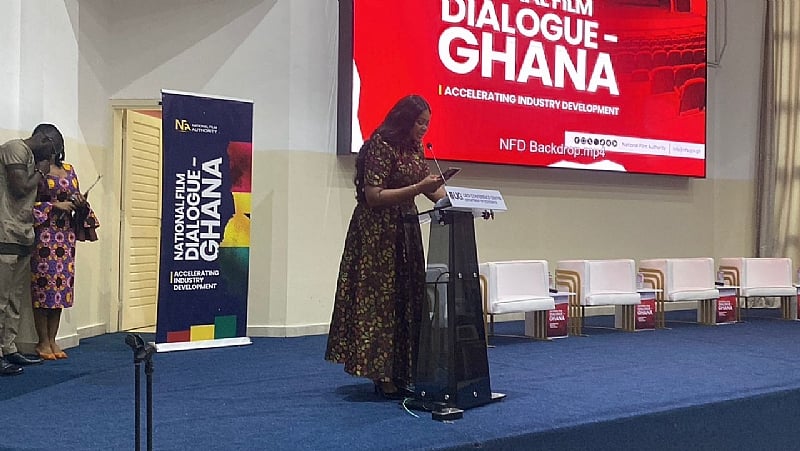The maiden edition of the Ghana Film Dialogue, held at the Cedi Conference Centre in Legon on September 16, 2025, brought together a constellation of prominent figures in the Ghanaian film industry, along with government officials and industry experts, to address the challenges and chart a course for the sector’s future. The event, themed “Accelerating Industry Development,” underscored the collective commitment to propel Ghana’s film industry onto the global stage, tackling critical issues such as funding, training, technological advancements, and content creation. The presence of high-profile attendees, including Deputy Creative Arts Minister Hon. Yussif Issaka Jajah, Ashanti Regional Minister Dr. Frank Amoakohene, Director of Diaspora Affairs Kofi Okyere Darko, and renowned actors like Fred Amugi, Roselyn Ngissah, Nicki Samonas, Bill Asamoah, and Martha Ankomah, highlighted the significance of the dialogue and the industry’s collective pursuit of growth.
The Ghana Film Dialogue served as a dynamic platform for open discussions and collaborative brainstorming, effectively navigating through a range of crucial topics. The dialogue provided a forum for filmmakers, producers, and industry experts to share their perspectives and insights, fostering a collaborative environment to address the challenges and opportunities facing the Ghanaian film industry. The discussions encompassed a wide spectrum of critical areas, including the art of storytelling, the importance of sound design and visual production, securing financial resources for film projects, effective marketing strategies, and leveraging technology to enhance competitiveness in the global film market. The event highlighted the importance of inclusive decision-making in policy development, ensuring that all stakeholders have a voice in shaping the future of Ghana’s film industry.
Kafui Danku-Pitcher, Executive Secretary of the National Film Authority (NFA), emphasized the vital role of collaborative policy development, ensuring that all stakeholders’ voices are heard. She stressed the NFA’s commitment to enhancing the skillset of Ghanaian filmmakers, announcing plans to introduce training programs in storytelling, sound design, and visual production, facilitated by global experts. These initiatives are aimed at addressing the persistent challenges of inadequate training and outdated production techniques that have hampered the industry’s growth.
The Ghana Film Dialogue not only diagnosed the industry’s shortcomings but also celebrated its potential and highlighted promising developments. The announcement of a GHS100,000 donation from the Ghana Academy of Film and Television Arts (GAFTA) towards the long-awaited film fund injected a wave of optimism into the discussions. This significant contribution, described as a “wake-up call” by Kafui Danku-Pitcher, is expected to galvanize further financial support and pave the way for more ambitious film projects. The dialogue underscored the importance of financial resources in enabling Ghanaian filmmakers to realize their creative visions and contribute to the industry’s growth.
Central to the discussions at the Ghana Film Dialogue was the strategic integration of technology to elevate both production and marketing aspects of Ghanaian films. Participants recognized the power of technology in enhancing the quality of filmmaking, streamlining distribution channels, and reaching wider audiences both domestically and internationally. The emphasis on technology reflected the industry’s determination to adapt to the evolving global landscape and compete effectively with international productions. By embracing modern tools and techniques, Ghanaian filmmakers can elevate the quality of their work, optimize distribution strategies, and expand their reach to global audiences.
The dialogue also delved into critical issues related to content creation, emphasizing the need for compelling storytelling and adherence to high-quality standards. Concerns were raised about inconsistent storytelling and the prevalence of outdated production methods, hindering the industry’s ability to capture a wider audience. Participants stressed the importance of stronger regulations to maintain quality standards, ensuring that Ghanaian films adhere to professional benchmarks. The call for enhanced storytelling underscores the desire to create narratives that resonate with audiences and showcase the richness of Ghanaian culture and experiences. The emphasis on quality control reflects the industry’s commitment to producing films that meet international standards and can compete on the global stage.














